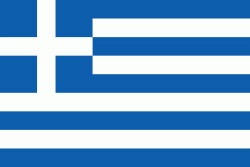Farsala (Dimos Farsala)
Farsala (Φάρσαλα), known in Antiquity as Pharsalos (Φάρσαλος, Pharsalus), is a city in southern Thessaly, in Greece. Farsala is located in the southern part of Larissa regional unit, and is one of its largest towns. Farsala is an economic and agricultural centre of the region. Cotton and livestock are the main agricultural products, and many inhabitants are employed in the production of textile. The area is mostly famous for being the birthplace of Achilles, a mythical ancient Greek hero and the sight of a major battle between Roman generals Gaius Julius Caesar and Gnaeus Pompeius in 48 BC.
Farsala lies at the southern edge of the Thessalian Plain, 4 km south of the river Enipeas. The Greek National Road 3 (Larissa - Lamia) and the Greek National Road 30 (Karditsa - Volos) pass through the town. The Palaiofarsalos railway station (litt. "Ancient Pharsalus"), on the line from Athens to Thessaloniki and head of the branch line to Kalambaka, is located in the village of Stavros, 12 km to the west. Farsala is located 38 km south of Larissa, 41 km east of Karditsa, 44 km north of Lamia and 49 km west of Volos.
The municipality Farsala has an area of 739.74 km2, the municipal unit Farsala has an area of 121.433 km2, and the community Farsala has an area of 57.928 km2.
Farsala lies at the southern edge of the Thessalian Plain, 4 km south of the river Enipeas. The Greek National Road 3 (Larissa - Lamia) and the Greek National Road 30 (Karditsa - Volos) pass through the town. The Palaiofarsalos railway station (litt. "Ancient Pharsalus"), on the line from Athens to Thessaloniki and head of the branch line to Kalambaka, is located in the village of Stavros, 12 km to the west. Farsala is located 38 km south of Larissa, 41 km east of Karditsa, 44 km north of Lamia and 49 km west of Volos.
The municipality Farsala has an area of 739.74 km2, the municipal unit Farsala has an area of 121.433 km2, and the community Farsala has an area of 57.928 km2.
Map - Farsala (Dimos Farsala)
Map
Country - Greece
 |
 |
| Flag of Greece | |
Greece is considered the cradle of Western civilization, being the birthplace of democracy, Western philosophy, Western literature, historiography, political science, major scientific and mathematical principles, theatre and the Olympic Games. From the eighth century BC, the Greeks were organised into various independent city-states, known as poleis (singular polis), which spanned the Mediterranean and the Black Sea. Philip II of Macedon united most of present-day Greece in the fourth century BC, with his son Alexander the Great rapidly conquering much of the ancient world, from the eastern Mediterranean to the North Western parts of India. The subsequent Hellenistic period saw the height of Greek culture and influence in antiquity. Greece was annexed by Rome in the second century BC, becoming an integral part of the Roman Empire and its continuation, the Byzantine Empire, which was culturally and linguistically predominantly Greek.
Currency / Language
| ISO | Currency | Symbol | Significant figures |
|---|---|---|---|
| EUR | Euro | € | 2 |
| ISO | Language |
|---|---|
| EN | English language |
| FR | French language |
| EL | Greek language |















